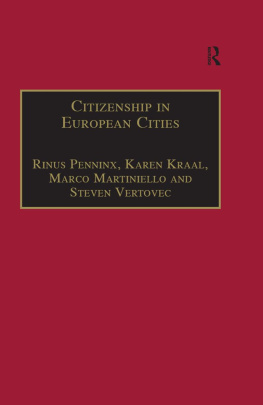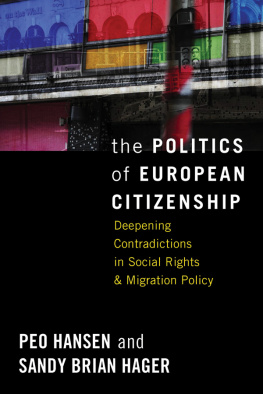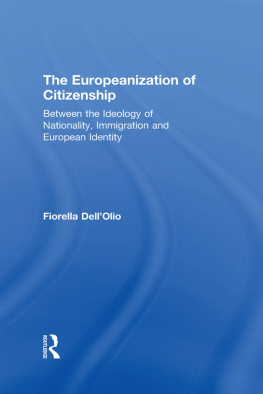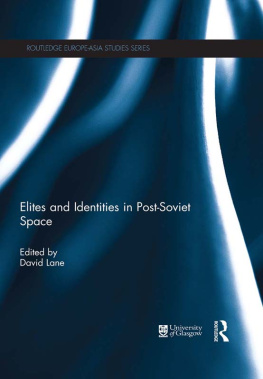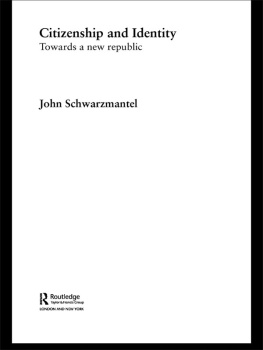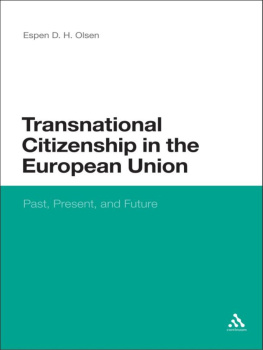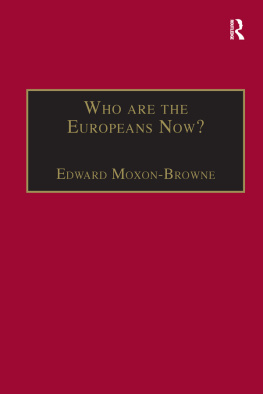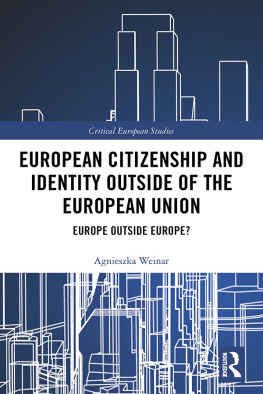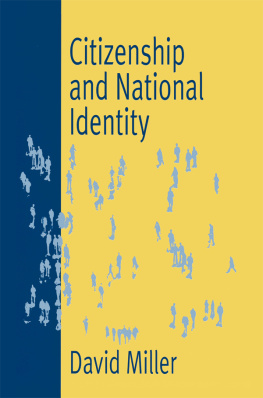NEW EUROPEAN IDENTITY AND CITIZENSHIP
This book is part of a research program financed by a grant from the Ford Foundation
New European Identity and Citizenship
Edited by
RMY LEVEAU
KHADIJA MOHSEN-FINAN
and
CATHERINE WIHTOL DE WENDEN
First published 2002 by Ashgate Publishing
Reissued 2018 by Routledge
2 Park Square, Milton Park, Abingdon, Oxon OXl 4 4RN
711 Third Avenue, New York, NY 10017, USA
Routledge is an imprint of the Taylor & Francis Group, an iriforma business
Copyright Rmy Leveau, Khadija Mohsen-Finan, Catherine Wihtol de Wenden 2002
The editors have asserted their moral right under the Copyright, Designs and Patents Act, 1988, to be identified as the editors of this work.
All rights reserved. No part of this book may be reprinted or reproduced or utilised in any form or by any electronic, mechanical, or other means, now known or hereafter invented, including photocopying and recording, or in any information storage or retrieval system, without permission in writing from the publishers.
Notice:
Product or corporate names may be trademarks or registered trademarks, and are used only for identification and explanation without intent to infringe.
Publishers Note
The publisher has gone to great lengths to ensure the quality of this reprint but points out that some imperfections in the original copies may be apparent.
Disclaimer
The publisher has made every effort to trace copyright holders and welcomes correspondence from those they have been unable to contact.
Ifri (Institut fran~ais des relatios intemationales) is a research centre and a forum for debate on major international political and economic issues. Headed by Thierry de Montbrial since its founding in 1979, Ifri is a non-profit organization. Its office is in Paris.
The opinions expressed in this book are the responsibility of the authors alone.
A Library of Congress record exists under LC control number: 2002074459
ISBN 13: 978-1-138-71786-2 (hbk)
ISBN 13: 978-1-315-19617-6 (ebk)
Contents
List of Contributors
Rmy Leveau, Khadija Mohsen-Finan and Catherine Wihtol de Wenden
Vassoodeven Vuddamalay
Stefano Allievi
Bernab Lpez Garcia
Marco Martiniello
Catherine Wihtol de Wenden
Rmy Leveau
Riva Kastoryano
Danile Joly and Karima Imtiaz
Khadija Mohsen-Finan
Stefano ALLIEVI
Research Fellow, Universita degli studi di Padova,
Italy
Karima IMTIAZ
Senior Lecturer, Centre for the Study of Islam and Christian-Muslims Relations, Great Britain
Danile JOLY
Director, Centre for Research on Ethnic Relations, University of Warwick, Great Britain
Riva KASTORYANO
Research Fellow, Centre national de la recherche scientifique (CNRS)/Centre dtudes et de recherches internationales (CERI),
France
Rmy LEVEAU
Professor, Institut dtudes politiques de Paris,
Scientific Advisor, Insitut franais des relations intemationales (Ifri),
France
Bernab LPEZ GARCA
Professor, Universidad Autonoma de Madrid,
Spain
Marco MARTINIELLO
Senior Research Fellow and Senior Lecturer,
Centre dtudes de lethnicit et des migrations (CEDEM),
Belgique
Khadija MOHSEN-FINAN
Research Fellow, Insitut franais des relations internationales (Ifri),
France
Vassoodeven VUDDAMALAY
Research Fellow, Universit dEvry,
France
Catherine WIHTOL DE WENDEN
Senior Research Fellow, Centre national de la recherche scientifique (CNRS)/Centre dtudes et de recherches interantionales (CERI),
France
Rmy Leveau
Khadija Mohsen-Finan
Catherine Wihtol De Wenden
European countries are handling in different ways the new attitudes towards citizenship and identity that immigrants bring with them.
France continues to absorb immigrants by offering them individual citizenship and refusing to recognise public expression of their collective identity. In the United Kingdom, ethnic community organisations are more politically and socially accepted, even if they do not have full legal status.
But all these paths to integration are now being threatened by strong assertions of identity that are weakening nation-states. In several European Union countries, for example, direct relationships are developing between their regions and the EU. The European Court of Justice has been receiving complaints, especially concerning human rights, from individuals against their own countries. Such developments could undermine national sovereignty in the face of demands for a new, negotiated citizenship.
The policy of assimilation as a way of more effectively absorbing immigrants is now being challenged. By making nationalistic or cultural-religious demands, Corsicans and Muslims are showing that loyalty to an island or religion does not conflict with having French citizenship.
As it seeks to establish itself, European citizenship is acquiring its own internal borders in the shape of the Other the non-European, the Muslim and people who are marginalized. So a split is growing inside the EU, between Europeans who can move around and live and work where they want and non- Europeans who need entry and residence visas. This is leading to discriminatory treatment of social groups based on their personal situations.
In terms of law and representation, many people from former French and British colonies see the new European political entity as a step backwards from the freedom of movement they inherited from colonial times. A new fortress Europe is being built that excludes less well-off people suspected of having multiple allegiances. To cope with these differences, Europe will have to devise means of regulation that go beyond those of individual states.
While the current immigration to Europe is here to stay, it is also diversifying and breaking free of its colonial past. New host countries that were once simply sources of immigrants Italy, Spain, Portugal and Greece are now faced with people they have little or no historic or cultural links with and also new kinds of immigrants, such as women, children who arrive by themselves, unsuccessful asylum-seekers, educated middle-class youngsters, intellectuals and technicians. These newcomers have created immigrant networks that give them a transnational mobility. As the new century begins, a situation of migratory flows,1 a new universalism involving new political configurations, is developing, despite the routine existence of visas and passports, as well as reaffirmation of the right to emigrate when authoritarian regimes fall or weaken (in southern and eastern Europe, but also in Latin America and Asia) even if the right of entry is far from guaranteed based more on the issues of globalisation and human rights than on solidarity between communities.







